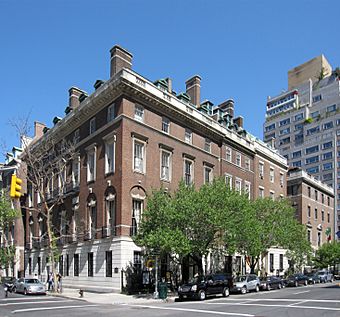Percy R. Pyne House facts for kids
|
Percy R. Pyne House
|
|
|
U.S. Historic district
Contributing property |
|

Percy R. Pyne House on Park Avenue
|
|
| Location | 680 Park Ave, New York, New York |
|---|---|
| Built | 1909-1911 |
| Architect | McKim, Mead & White |
| Architectural style | Neo-Federal |
| Part of | Park Avenue Houses (ID80002708) |
Quick facts for kids Significant dates |
|
| Designated CP | January 3, 1980 |
The Percy R. Pyne House is a beautiful old building in New York. It's a type of house called a townhouse and is located at 680 Park Avenue. You can find it at the corner of Park Avenue and 68th Street in Manhattan. It was built in a style called Neo-Federal.
Today, an organization called the Americas Society uses this building. It's their main office in New York City.
Contents
History of the Pyne House
Building the House
The Percy R. Pyne House was designed by famous architects named McKim, Mead & White. It was built between 1909 and 1911. The house was made for a man named Percy Rivington Pyne II. His grandfather, Moses Taylor, was a very successful businessman who managed money.
The way this house was built, with its special materials and size, set a trend. Other architects building houses nearby copied its style.
Later Uses of the Building
From 1948 to 1963, the building was used by the Soviet Union's group for the United Nations. This group was called the Soviet Mission.
In 1965, a kind person named Margaret Rockefeller Strong de Larraín, Marquesa de Cuevas bought the house. She then gave it to the Americas Society. This generous act saved the building from being torn down.
A Landmark Building
The Percy R. Pyne House is part of a special group of buildings. It stands next to the Oliver D. Filley House and the Henry P. Davison House. These three buildings together form one of the last original groups of houses on Park Avenue.
The building was officially named a New York City landmark on November 10, 1970. This means it's a very important historical building. A special sign, called a landmark plaque, was put on the building in 1971. This plaque was given by the New York Community Trust.
 | Selma Burke |
 | Pauline Powell Burns |
 | Frederick J. Brown |
 | Robert Blackburn |




